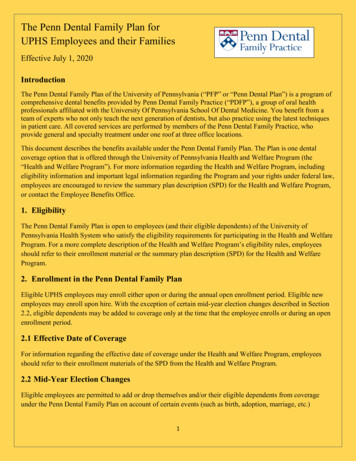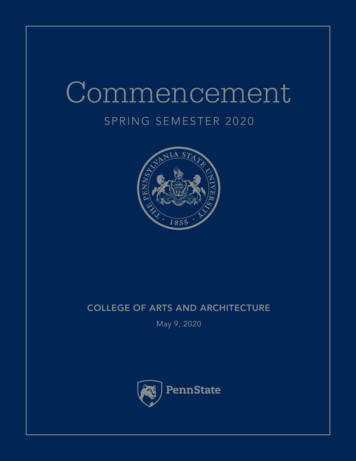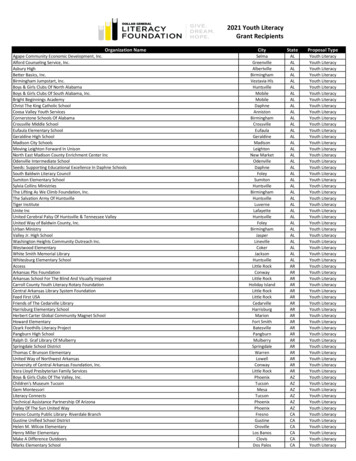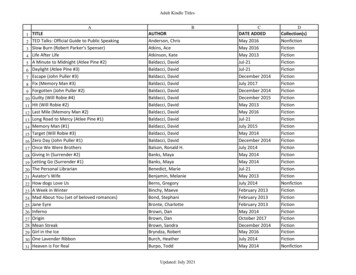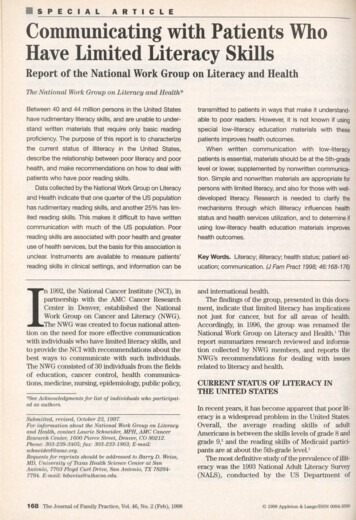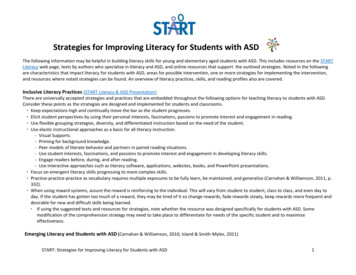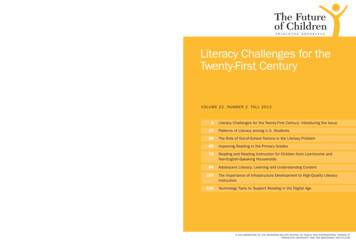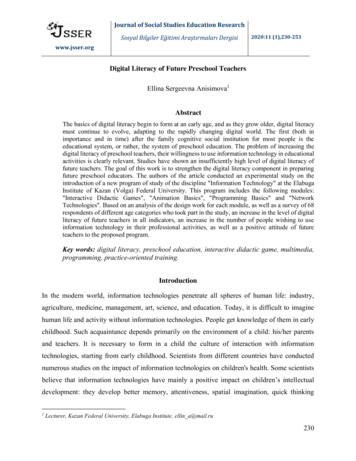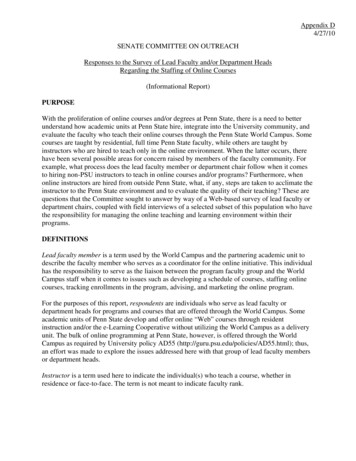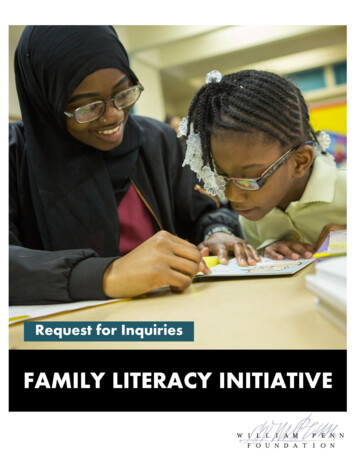
Transcription
Request for InquiriesFAMILY LITERACY INITIATIVE
IntroductionThe William Penn Foundation (WPF) has a longhistory of investing in programs that supportearly development and improve schoolreadiness and academic success for children.Recognizing that primary caregivers* play anessential role in supporting social, emotional,and academic outcomes for children, WPF seeksto increase opportunities to support adults intheir role as their child’s first teacher.The Family Literacy Initiative will increaseaccess to two-generation literacy programmingin Philadelphia. This initiative will helporganizations deepen and expand theconnections between adult and child literacyprogramming and improve language andliteracy skills and practices for adults andchildren.Family literacy emerged in the late 1980s withthe federally funded Even Start Family LiteracyProgram, which was designed to “integrateearly childhood education, adult literacy (adultbasic and secondary-level education andinstruction for English language learners),parenting education, and interactive parent andchild literacy activities for low-incomefamilies.”1 Family literacy is still funded inseveral states and local communities.2 Itremains a critical strategy to increase theeducation levels of caregivers and theirchildren. Research has shown that overall,family literacy programming strengthenschildren’s literacy skill development3 andparental education outcomes.4 Family literacyprograms take many forms, but they share acommon goal of providing some form of adultand early childhood education and equippingcaregivers to support their children’s learning.BackgroundFamily literacy programs (also known as familylearning, intergenerational literacy, or, morerecently, two-generation programs) are basedon the premise that caregivers play a crucialrole in their children’s language and literacydevelopment and academic achievement, andthat both adults and children need access toeducational services.*Throughout this document, the term caregivers willbe used to refer to the parents, other adult familymembers, or guardians who have primaryresponsibility for raising a child.Family Literacy Initiative 2
Family Literacy InitiativeObjectivesOverviewThe objectives of the three-year (December2018-December 2021) initiative are to:WPF requests Letters of Inquiry for three-yearprojects that embrace a two-generationapproach to engaging children and families inliteracy building activities.WPF seeks to fund 5-7 programs in Philadelphiathat focus on implementing best practices fromthe field of family literacy and include explicitprogramming for adults and children as well asintergenerational literacy activities. Implement high-quality, linguistically andculturally responsive family literacyprograms in low-income communities inPhiladelphia; Develop or strengthen partnershipsbetween current adult and children’sliteracy initiatives; Identify program practices and strategiesthat successfully reach low-income familiesand young children ages 0-8 in high-qualityliteracy experiences; Evaluate the impact of family literacyprogramming on children and adults; Build a network of family literacyprofessionals and educators to foster peerlearning, collaboration, and resourcesharing; and Disseminate evaluation findings to relevantstakeholders, including educators,practitioners, policy makers, researchers,government officials, and communityorganizations.Eligibility Community-based organizations: socialservice organizations, neighborhoodassociations, religious institutions, childcarecenters, medical providers, communitydevelopment organizations, recreationcenters, and others that are firmly rooted intheir communities and serve families withyoung children.Public institutions such as libraries,government entities, K-12 schools, andcolleges.Organizations with experience providingliteracy-based programming to adultsand/or children.Family Literacy Initiative 3
Project CriteriaProposed projects should be informed by research and evidence. Although the project design is flexibleand will be tailored to the community and target audience, all proposed projects should address thefollowing criteria:Community NeedThe inquiry demonstrates a clear understanding of community and family needsand the likely pool of participating families. The project focuses on a populationand/or neighborhood or geographic area where there is demonstrated need forfamily literacy services.ParticipantInvolvementThe inquiry describes how families were consulted in shaping the proposal; howthey will be involved in informing program planning, implementation, andevaluation; and how high levels of family engagement and participation will bemaintained. The inquiry describes how partners have successfully undertakenefforts to engage caregivers in the past.Three IntegratedProgramComponentsThe inquiry describes three integrated programmatic components that have astrong research base and will have sufficient intensity and duration to achieve thedesired outcomes:(1) Adult Education: develop adults’ ability to support their children’s literacyand education, engage with their children’s teachers and schools (daycare,preschool, K-12), and develop their own language and literacy skills. Theadult education component does not need to be a traditional GED , ABE, orliteracy class, but it should include activities that enhance parents’ languageand print and digital literacy development.(2) Interactive Literacy: offer interactive, intergenerational literacy activities andhelp caregivers apply the strategies they have learned with their children.(3) Early Childhood Education: provide language- and literacy-focusededucational activities for children age birth to 8. (Families may bring childrenolder than 8, but child outcomes will only be measured for the target agegroup.)Cultural andLinguisticResponsivenessThe inquiry demonstrates how the intervention will be culturally and linguisticallyresponsive and appropriate, including the provision of interpreters andtranslation, if needed.Family Literacy Initiative 4
Support Servicesand ParticipantResourcesThe program will provide adequate support services so that participants canattend activities and access resources needed to implement learning activities athome (e.g., transportation, childcare, learning materials, incentives, food duringprogram activities, social service referrals). Include information on staffingrelated to providing support services and making referrals. The applicant mustalso describe a plan to provide the intervention during convenient times forfamilies and describe how families will be recruited.OrganizationalResources andCapacityThe inquiry has a preliminary plan for implementation, including identifyingexisting or new staff members who have the necessary qualifications and otherresources needed to effectively deliver the intervention.PartnershipThe project builds on and connects with relevant resources, initiatives, andorganizations in Philadelphia to provide the educational and support servicessuch as Read by 4th, myPLACE, school initiatives, early childhood education, andhome visiting programs.SustainabilityThe inquiry identifies ideas about how the intervention will be sustained beyondthe grant period.Family Literacy Initiative 5
EvaluationFunded projects will participate in an external,outcomes and formative evaluation. Theevaluation will assess whether the familyliteracy programs influence:a) Children’s outcomes Language and literacy growth (e.g.,development in phonologicalawareness, oral language, vocabulary,alphabetic awareness). Educational and literacy outcomes inschool (e.g., reading at grade level,kindergarten readiness, reading gains)and/or out-of-school settings (e.g.,reading frequency and enjoyment,library usage, literacy practices athome).b) Caregiver outcomes Support for and involvement in theirchild’s language and literacy growth. Involvement in their child’s education(e.g., engagement with schools/centers,supporting learning and literacy athome). Involvement in everyday literacypractices (e.g., ability to access andenjoy reading, library usage, reading athome). Development of their own languageand print and digital literacy skills.c) Implementation Project structure and staffing Building on and connecting with preexisting resources and initiatives. Participant demographics andexperiences.Participation in the program evaluation will beexpected through data submission,communication with evaluators, and site visits.Information collected in the formativeevaluation will be shared with sites forcontinuous improvement.BudgetProject budgets should cover three years offunding and may include up to six months forplanning and professional development.Organizations are welcome and encouraged tobuild on existing programs, using WPF fundingto supplement or enhance those efforts.Preliminary project budgets should be allinclusive, including any fees to partnerorganizations or consultants. This informationcan be provided in the Inquiry Form narrative.The most competitive inquiries will have totalproject budgets under 350,000. Total fundingfrom WPF should not exceed 25% ofparticipating organizations’ operating budgetsduring the grant period.All aspects of project development andexecution, including planning, design, materials,community engagement, staffing, andimplementation, are eligible for funding.Professional development, technical assistanceand external evaluation costs should not beincluded, as this will be covered by WPFseparately.Family Literacy Initiative 6
TimelineJune 5, 2018Inquiry submission period opensJune 14, 2018Informational Webinar (see below)June 29, 2018Inquiry forms due by 5:00 PM ESTJuly 16, 2018Select applicants invited to submitproposalsAugust 10, 2018Proposals from invited applicantsdue by 5:00 PM ESTNovember 3, 2018Board review of selected proposalsDecember 2018 – December 2021Program implementation andevaluationProcessThe application process begins by submitting anInquiry Form through the WPF website by June29, 2018. The Portal Resource Guide can helpwalk organizations through the process of usingthe Foundation’s grant portal. A team willreview all Inquiry Forms and invite selectapplicants to submit a full proposal.In addition to completing the Inquiry Form,please attach a brief summary as “additionaldocumentation” describing the project’s keystaff, target age group, number of children tobe served, and program duration and frequencyof services.This request or any subsequent response doesnot commit William Penn Foundation or theresponding organization to any future fundingor engagement. If you have any questions,contact Jennifer Stavrakos n inquiry.Interestedorganizations are invited toparticipate in an informational webinar onThursday, June 14th at 3:00 PM EST.Please use this link to register for thewebinar.Family Literacy Initiative 7
3For example: van Steensel, R., Herppich, S., McElvany, N., & Kurvers, J. (2012). How effective are familyliteracy programs for children’s literacy skills? In B. H. Wasik (Ed.), Handbook of family literacy (2nd ed.,pp. 135-148). New York: Routledge.4For example: Sabol, T. J., Sommer, T. E., Chase-Lansdale, P. L., Brooks-Gunn, J., Yoshikawa, H., King, C.T., . . . Ross, E. C. (2015). Parents’ persistence and certification in a two-generation education andtraining program. Children and Youth Services Review, 58, 1-10.ResourcesFamily Engagement Resources Parent Engagement and Leadership Opportunities: development/practitioners-guide-6Participatory Practices in Adult Education: t-Education-Campbell/dp/0805837051/Adult Education Resources Adult education and literacy resources (LINCS): sAdult education: What makes teaching effective? https://www.calproonline.org/documents/CALPRO BRIEF 13 508.pdfEarly Childhood Education, Language, and Literacy Resources National Association for the Education of Young Children: www.naeyc.orgPhonological awareness is child’s play: http://teachingcommons.cdl.edu/tk/modules ay.pdfInteractive Literacy Activities Practitioner Guides: ide-2-8-24-12Family Literacy Initiative 8
Programmatic Examples Implementing an intergenerational literacy program with authentic literacy instruction:Challenges, responses, and results: /201009AndersonPurcell-GatesFullReport.pdfLiteracy for Life: An Intergenerational Literacy Program (A Handbook for lierHandbook.pdfCulturally and Linguistically Responsive Program Resources Head Start cultural and linguistic responsiveness resource responsiveness.pdfLiteracy for Life (see above)Working with preliterate and beginning literacy level parents in family literacy and parentinvolvement programs: development/practitioner-guide-3-11-27-12Family Literacy Initiative 9
Family Literacy Initiative 3 Family Literacy Initiative Overview WPF requests Letters of Inquiry for three-year projects that embrace a two-generation approach to engaging children and families in literacy building activities.

